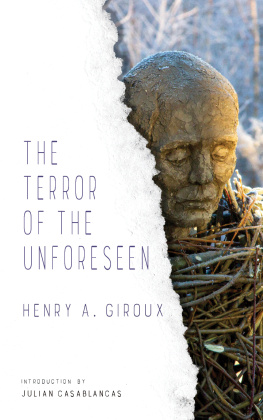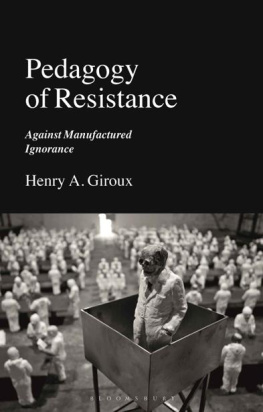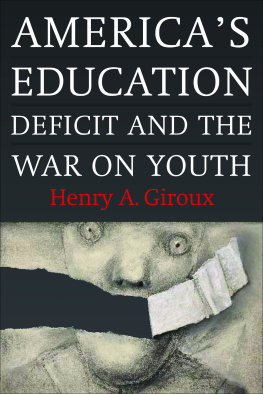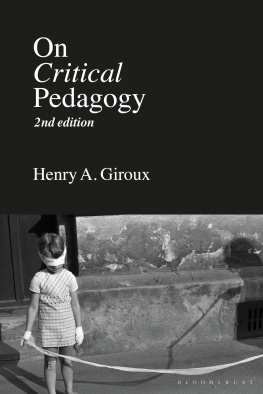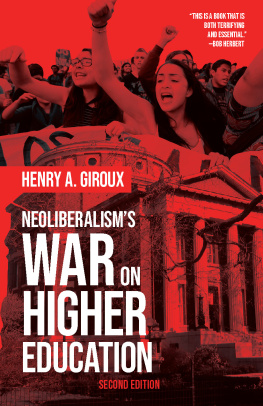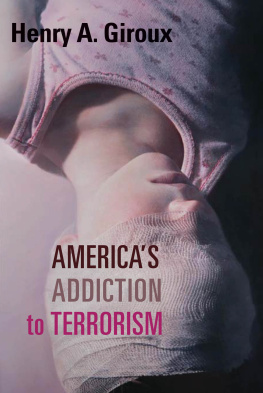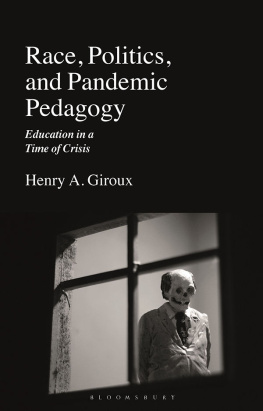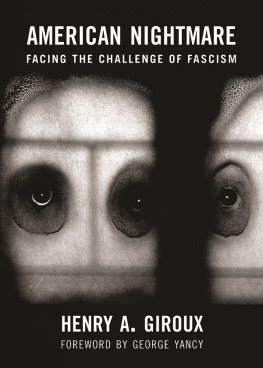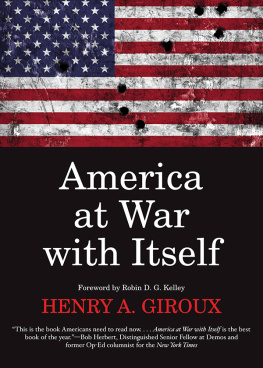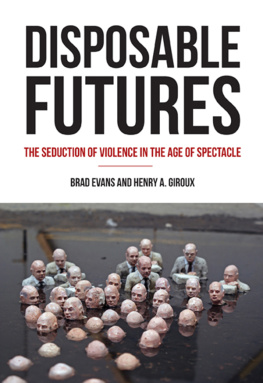Dangerous Thinking in the Age of the New Authoritarianism
Critical Interventions
Politics, Culture, and the Promise of Democracy
A Series from Paradigm Publishers
Edited by Henry A. Giroux, Susan Searls Giroux, and Kenneth J. Saltman
Twilight of the Social: Resurgent Publics in the Age of Disposability
By Henry A. Giroux (2011)
Youth in Revolt: Reclaiming a Democratic Future
By Henry A. Giroux (2012)
The Failure of Corporate School Reform
By Kenneth J. Saltman (2012)
Toward a New Common School Movement
By Noah De Lissovoy, Alexander J. Means, and Kenneth J. Saltman (2014)
First published 2015 by Paradigm Publishers
Published 2016 by Routledge
2 Park Square, Milton Park, Abingdon, Oxon OX14 4RN
711 Third Avenue, New York, NY 10017, USA
Routledge is an imprint of the Taylor & Francis Group, an informa business
Copyright 2015, Taylor & Francis.
All rights reserved. No part of this book may be reprinted or reproduced or utilised in any form or by any electronic, mechanical, or other means, now known or hereafter invented, including photocopying and recording, or in any information storage or retrieval system, without permission in writing from the publishers.
Notice:
Product or corporate names may be trademarks or registered trademarks, and are used only for identification and explanation without intent to infringe.
Cataloging-in-Publication Data Available from the Library of Congress
ISBN 13: 978-1-61205-863-4 (hbk)
ISBN 13: 978-1-61205-864-1 (pbk)
To those teachers, young people, and workers who chose to think critically and act courageously.
To Arshad and Freda.
To Susan, Chris, and Danielle.
Contents
I want to thank Susan Searls Giroux for her insights, support, and ability to extend the conversation further than I could have imagined. Her editorial skills are unparalleled, and I am thankful that she was able to take the time to edit many of the chapters in this book, especially with her busy schedule. My graduate students Tyler Pollard, Jennifer Fisher, and Clorinde Peters have been enormously helpful in pushing me to think through a number of important issues. I want to thank my colleagues and friends David L. Clark and Lindsay Fitzclarence for their comments and the generous amount of time they have been willing to give to reading this work. As usual, my assistant, Maya Sabados, has been indispensable in editing and reading endless drafts of every chapter. My editors at Truthout Victoria Harper, Leslie Thatcher, and Maya Schenwarhave provided me with unwavering support in publishing my work there, some of which is included in this book. I am enormously grateful to Dean Birkenkamp, who has been my editor for longer than I can remember. He is one of the great independent publishers in the United States, and in my mind he is a national hero for his willingness to struggle to make publishing mean something in dark times. Highly modified versions of some of these articles have been published in E-International Relations, Boundary 2, Thesis 11, Cultural Studies, Policy Futures in Education, Tikkun, Fast Capitalism, Tidal Basin Review, and Arena Magazine.
S ECTION 1
Orwell and Huxleys America
1
Between Orwell and Huxley
In spite of their differing perceptions of the architecture of the totalitarian superstate and how it exercises power and control over its residents, George Orwell and Aldous Huxley shared a fundamental conviction. They both argued that the established democracies of the West were moving quickly toward a historical moment when they would willingly relinquish the noble promises and ideals of liberal democracy and enter that menacing space where totalitarianism perverts the modern ideals of justice, freedom, and political emancipation. Both believed that Western democracies were devolving into pathological states in which politics was recognized in the interest of death over life and justice. Both were unequivocal in the shared understanding that the future of civilization was on the verge of total dominationor what Hannah Arendt called dark times.
While Neil Postman and other critical descendants have pitted Orwell and Huxley against each other because of their distinctively separate notions of a future dystopian society,
Both authors provide insight into the merging of the totalitarian elements that constitute a new and more hybridized form of authoritarian control, appearing less as fiction than a threatening portent of the unfolding twenty-first century. Consumer fantasies and authoritarian control; Big Brother intelligence agencies and the voracious seductions of privatized pleasures; the rise of the punishing state, which criminalizes an increasing number of behaviors and invests in institutions that incarcerate and are organized principally for the production of violence; the collapse of democratic public spheres into narrow, market-driven orbits of privatizationthese now constitute the new order of authoritarianism.
Orwells Big Brother has more recently found a new incarnation in the revelations of government lawlessness and corporate spying by whistleblowers such as Chelsea Manning, Jeremy Hammond, and Edward Snowden. Orwell offered his readers an image of the modern state in which privacy was no longer valued as a civil virtue and a basic human right, nor perceived as a measure of the robust strength of a healthy and thriving democracy. In Orwells dystopia the right to privacy had come under egregious assault, but more than that, such ruthless transgressions of privacy pointed to something more sinister than the violation of individual rights. The claim to privacy, for Orwell, represented a moral and political principle by which to assess the nature, power, and severity of an emerging totalitarian state. Orwells warning was intended to shed light on the horrors of totalitarianism, the corruption of language, the production of a pervasive stupidity, and the endless regimes of state spying imposed on citizens in the mid-twentieth century. Orwell opened a door for all to see a nightmarish future in which everyday life becomes harsh, an object of state surveillance, and controla society in which the slogan ignorance becomes strengthmorphs into a guiding principle of mainstream media, education, and the culture of politics.
Huxley shared Orwells concern about ignorance as a political tool of the elite, enforced through surveillance and the banning of books, dissent, and critical thought itself. But Huxley believed that social control and the propagation of ignorance would be introduced by those in power through the political tools of pleasure and distraction. Huxley thought that this might take place through the use of drugs and genetic engineering. But the real drugs and social planning of late modernity are found in an entertainment and public pedagogy industry that trades in pleasure and idiocymost evident in the merging of neoliberalism, celebrity culture, and the control of commanding cultural apparatuses extending from Hollywood movies and video games to mainstream television, news, and the social media.
Orwells Big Brother of 1984 has been upgraded in the 2015 edition. As Zygmunt Bauman points out, if the older Big Brother presided over traditional enclosures such as military barracks, prisons, schools, and countless other big and small panopticons, the updated Big Brother is concerned with not only inclusion and the death of privacy but also the suppression of dissent and the widening of the politics of exclusion.


